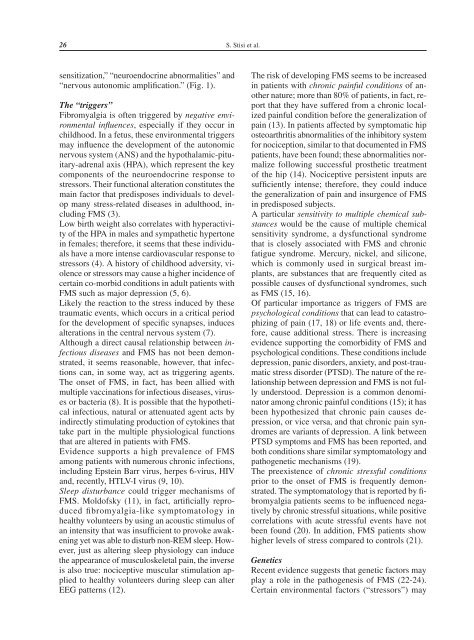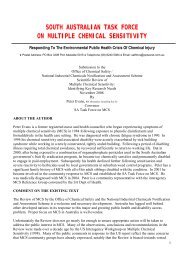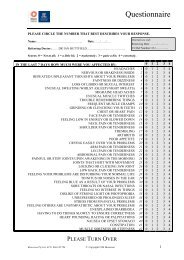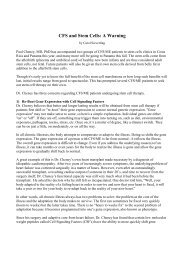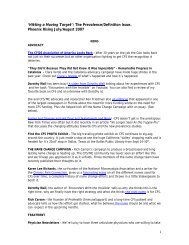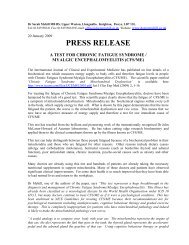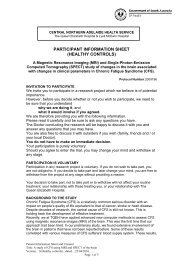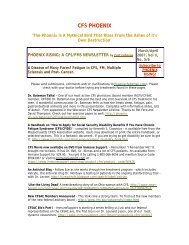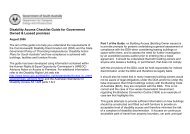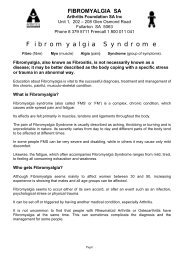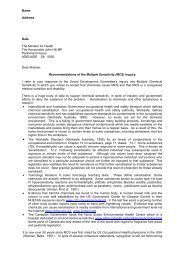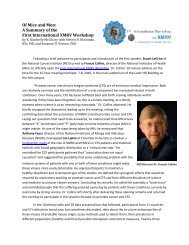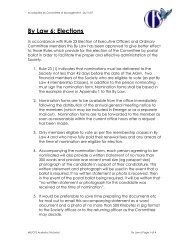1813 01 REUMA3 Editoriale - ME/CFS Australia
1813 01 REUMA3 Editoriale - ME/CFS Australia
1813 01 REUMA3 Editoriale - ME/CFS Australia
Create successful ePaper yourself
Turn your PDF publications into a flip-book with our unique Google optimized e-Paper software.
26 S. Stisi et al.sensitization,” “neuroendocrine abnormalities” and“nervous autonomic amplification.” (Fig. 1).The “triggers”Fibromyalgia is often triggered by negative environmentalinfluences, especially if they occur inchildhood. In a fetus, these environmental triggersmay influence the development of the autonomicnervous system (ANS) and the hypothalamic-pituitary-adrenalaxis (HPA), which represent the keycomponents of the neuroendocrine response tostressors. Their functional alteration constitutes themain factor that predisposes individuals to developmany stress-related diseases in adulthood, includingFMS (3).Low birth weight also correlates with hyperactivityof the HPA in males and sympathetic hypertonein females; therefore, it seems that these individualshave a more intense cardiovascular response tostressors (4). A history of childhood adversity, violenceor stressors may cause a higher incidence ofcertain co-morbid conditions in adult patients withFMS such as major depression (5, 6).Likely the reaction to the stress induced by thesetraumatic events, which occurs in a critical periodfor the development of specific synapses, inducesalterations in the central nervous system (7).Although a direct causal relationship between infectiousdiseases and FMS has not been demonstrated,it seems reasonable, however, that infectionscan, in some way, act as triggering agents.The onset of FMS, in fact, has been allied withmultiple vaccinations for infectious diseases, virusesor bacteria (8). It is possible that the hypotheticalinfectious, natural or attenuated agent acts byindirectly stimulating production of cytokines thattake part in the multiple physiological functionsthat are altered in patients with FMS.Evidence supports a high prevalence of FMSamong patients with numerous chronic infections,including Epstein Barr virus, herpes 6-virus, HIVand, recently, HTLV-I virus (9, 10).Sleep disturbance could trigger mechanisms ofFMS. Moldofsky (11), in fact, artificially reproducedfibromyalgia-like symptomatology inhealthy volunteers by using an acoustic stimulus ofan intensity that was insufficient to provoke awakeningyet was able to disturb non-REM sleep. However,just as altering sleep physiology can inducethe appearance of musculoskeletal pain, the inverseis also true: nociceptive muscular stimulation appliedto healthy volunteers during sleep can alterEEG patterns (12).The risk of developing FMS seems to be increasedin patients with chronic painful conditions of anothernature; more than 80% of patients, in fact, reportthat they have suffered from a chronic localizedpainful condition before the generalization ofpain (13). In patients affected by symptomatic hiposteoarthritis abnormalities of the inhibitory systemfor nociception, similar to that documented in FMSpatients, have been found; these abnormalities normalizefollowing successful prosthetic treatmentof the hip (14). Nociceptive persistent inputs aresufficiently intense; therefore, they could inducethe generalization of pain and insurgence of FMSin predisposed subjects.A particular sensitivity to multiple chemical substanceswould be the cause of multiple chemicalsensitivity syndrome, a dysfunctional syndromethat is closely associated with FMS and chronicfatigue syndrome. Mercury, nickel, and silicone,which is commonly used in surgical breast implants,are substances that are frequently cited aspossible causes of dysfunctional syndromes, suchas FMS (15, 16).Of particular importance as triggers of FMS arepsychological conditions that can lead to catastrophizingof pain (17, 18) or life events and, therefore,cause additional stress. There is increasingevidence supporting the comorbidity of FMS andpsychological conditions. These conditions includedepression, panic disorders, anxiety, and post-traumaticstress disorder (PTSD). The nature of the relationshipbetween depression and FMS is not fullyunderstood. Depression is a common denominatoramong chronic painful conditions (15); it hasbeen hypothesized that chronic pain causes depression,or vice versa, and that chronic pain syndromesare variants of depression. A link betweenPTSD symptoms and FMS has been reported, andboth conditions share similar symptomatology andpathogenetic mechanisms (19).The preexistence of chronic stressful conditionsprior to the onset of FMS is frequently demonstrated.The symptomatology that is reported by fibromyalgiapatients seems to be influenced negativelyby chronic stressful situations, while positivecorrelations with acute stressful events have notbeen found (20). In addition, FMS patients showhigher levels of stress compared to controls (21).GeneticsRecent evidence suggests that genetic factors mayplay a role in the pathogenesis of FMS (22-24).Certain environmental factors (“stressors”) may


